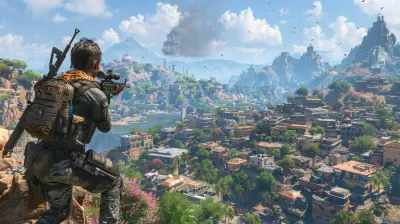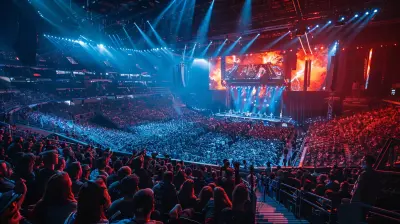The Role of Media in Shaping Esports Team Reputations
15 November 2025
Esports has become the rock concert of this generation – flashy lights, roaring digital crowds, and teams that now hold the same weight in fame as traditional sports squads. But behind the massive prize pools and sold-out arenas lies a powerful force you might not think about much: the media.
You ever wonder why certain esports teams seem to pop up everywhere – on your social feed, Twitch highlights, podcast interviews, headline articles – while others float in the background even though they’re crushing it in tournaments? That’s no accident. The media isn’t just reporting on esports; it’s actively shaping how we see these teams. And when we say "media," we’re talking about everything from YouTube channels and Reddit threads to gaming news sites and influencer commentary.
Let’s dive into how media coverage can elevate or sabotage an esports team’s reputation – and why it matters more than you think.
Why Reputation is Everything in Esports
Before we get too deep, let's get one thing straight: reputation is currency in the esports world.An esports team’s reputation affects EVERYTHING — sponsorship deals, fan engagement, team morale, and even recruitment of top talent. It’s not just about who wins the most matches. Sometimes, the team with the strongest fan base and best branding ends up winning the war, even if they lose a few battles.
Think about it. Would you rather watch a team that’s dominating the rankings but gives off a toxic vibe, or a team that plays their heart out and has a fun, supportive community? Fans connect with personalities just as much as gameplay — if not more.
The Media: Esports’ Reputation Architects
So how exactly does the media influence all this? Well, here’s where things get interesting. The media doesn’t just tell us what happened — it tells us how to feel about it.1. Framing the Narrative
One of the most powerful tools media has is framing. It’s not just “Team A beat Team B” — it’s "Team A’s incredible comeback victory" or "Team B’s shocking collapse." The tone, the phrasing, the visuals — they all shape how you process that information.If a team gets branded as “up-and-coming underdogs,” fans will rally behind them. Position that same team as “inexperienced and erratic,” and suddenly, they’ve got a PR problem.
2. Highlight Reels and Clip Culture
Let’s talk clips. Social media LOVES short, high-energy moments. A single clutch play or emotional team reaction can go viral in seconds. Instantly, that team becomes THE moment.Think about how many people got into esports through a 30-second montage or a meme-worthy post-game interview. These moments humanize players and create emotional attachments. Teams that generate buzz with highlight reels get clicks, shares, and fans.
And guess who controls which clips get shown, edited, and shared? Yep – the media.
The Good, The Bad, and The Biased
Media exposure is a double-edged sword. It can skyrocket a team’s popularity, but it can also drag them through the mud. Let’s break it down.The Good: Building Legends
When done right, media coverage can turn esports teams into legends. Just look at teams like T1, Fnatic, or Team Liquid. They became household names not just by winning but by owning their narrative in the media.Journalists, YouTubers, and influencers built up their storylines — rivalries, redemption arcs, personality spotlights. Media coverage turned them from line-ups into brands.
Some teams even hire PR managers and social media strategists to make sure their story stays on point. And honestly? That’s a smart move.
The Bad: Cancel Culture and Scandals
On the flip side, the media can push teams into the spotlight for all the wrong reasons. When drama hits — like internal conflicts, player suspensions, or toxic community behavior — media outlets are quick to jump on it.And in esports, things spread fast. A poorly handled statement or unverified rumor can ruin reputations overnight.
It’s a high-stakes game. One headline might shape public perception more than a whole tournament performance.
The Biased: Popularity Over Performance?
Let’s be real — not all media coverage is fair. Some teams get way more attention simply because they’re backed by millionaire investors, celebrity owners, or flashy marketing. Meanwhile, smaller or regional teams can dominate gameplay but get overlooked.It’s not always about who’s the best — it’s about who the media chooses to spotlight. Which means talent doesn’t always equal clout. Frustrating, but true.
Influencers and Streamers: The Wild Cards of Media
Here’s the plot twist: traditional media isn’t the only game in town anymore. In the esports universe, influencers and streamers hold serious power.When a popular streamer gives a shoutout to a team or plays a match with one of their players, it can lead to a massive boost in reputation. Just like how a celebrity endorsement boosts sneaker sales, a Twitch shoutout can skyrocket a team’s reputation.
These personalities blur the line between reporter and entertainer. They’re trusted, relatable, and often more influential than mainstream outlets. Teams that align with the right personalities can ride that wave straight into stardom.
How Social Media Became the Battlefield
Social media is where an esports team’s reputation lives and dies. Twitter, TikTok, Reddit, YouTube – they’re not just platforms. They’re battlegrounds.Twitter Wars and Instant Reactions
In esports, Twitter is the digital locker room. Players, fans, and analysts all hang out there — talking trash, starting debates, or hyping up matches. A single tweet can trend worldwide.That’s both powerful and dangerous. One misstep can ignite the community, leading to backlash that spreads like wildfire. On the flip side, a carefully crafted tweet can earn fan respect and go viral for the right reasons.
Reddit’s Role in Hype and Hate
Reddit is another beast entirely. Esports subreddits can build up teams with incredible enthusiasm or tear them down with a flurry of critical threads. What happens there often bleeds into mainstream media coverage. If Reddit decides a team is “overrated,” don’t be surprised when talking heads start saying the same.Reddit doesn’t have a filter — which means it’s authentic, but also brutal.
Players, Teams, and Their Media Game
So how can esports teams control their media narrative instead of being controlled by it?Investing in Branding
Teams that treat their organization like a brand — with consistent logos, storytelling, behind-the-scenes access, and strong community management — do better in the media spotlight. Why? Because they’re media-friendly.Think of it like prepping an actor for the Oscars. You want them looking sharp, sounding great, and ready to represent.
Building Media-Savvy Players
Teams are also starting to train players in media communication. From how to handle interviews to what to post online – the smart teams know that their players aren’t just athletes now. They’re public figures.Helping players craft their own media persona gives fans more to connect with — and that connection builds loyalty.
The Future: Media Will Decide Who Stays Relevant
As esports continues to grow, media influence will only get stronger. We’re seeing more documentary-style storytelling, more behind-the-scenes content, and even Netflix-style series focused on teams and rivalries.Teams that adapt to this reality are going to thrive. Those who ignore it? They’ll be left behind.
In the future, winning might not be enough. Esports teams need to master the art of telling their story — or someone else will do it for them.
Final Thoughts: Play the Game, Win the Fame
At the end of the day, esports is about competition — but reputation? That’s a long game. The media is the lens through which fans see the players and teams they love.So, whether you’re part of a team, a fan, or just a curious gamer, remember this: what happens in-game is just one chapter. The media tells the rest of the story.
And in the world of esports, the story is everything.
all images in this post were generated using AI tools
Category:
Esports TeamsAuthor:

Brianna Reyes
Discussion
rate this article
1 comments
Kiera McGinnis
Great article! You’ve captured the intricate relationship between media coverage and esports team reputations effectively. It’s fascinating how public perception is influenced by media narratives. Looking forward to more insights on this topic!
November 24, 2025 at 6:01 AM

Brianna Reyes
Thank you for your thoughtful comment! I'm glad you found the article insightful. Stay tuned for more on this topic!


